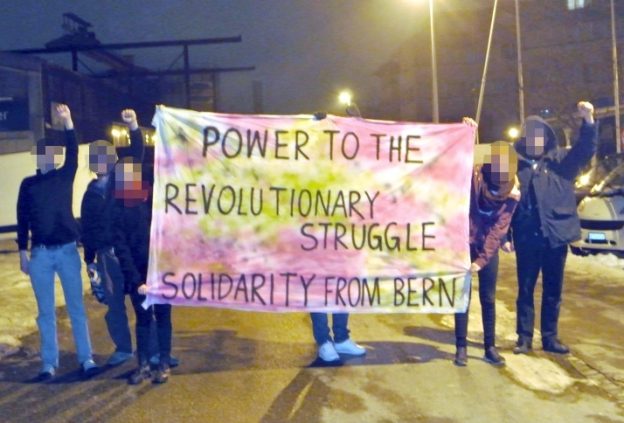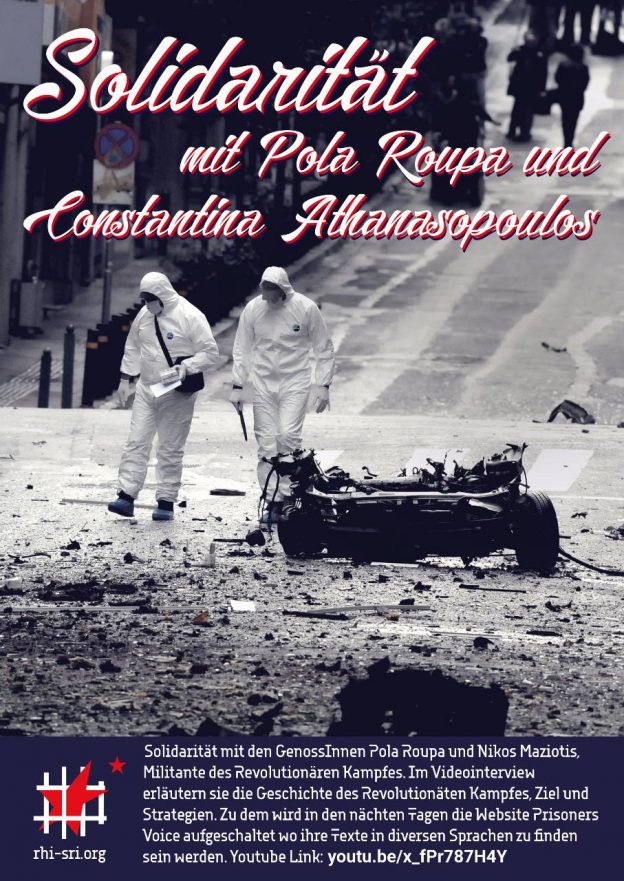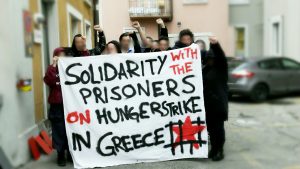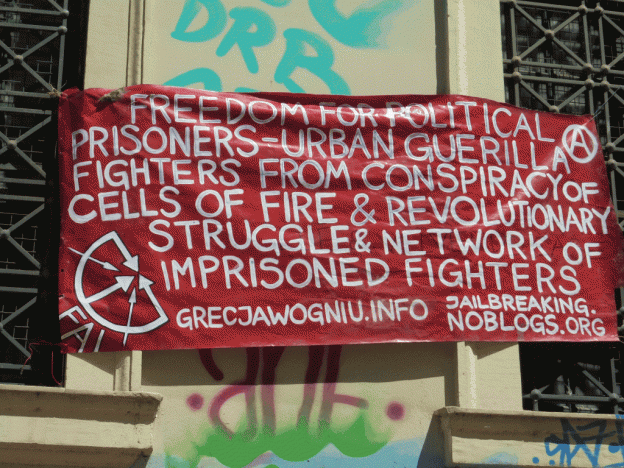Das Gespräch wurde schriftlich auf englisch geführt. Nikos ist 2016 zu lebenslänglich verurteilt worden.
Redaktion des „Gefangenen Info“.
Nikos, du hast geschrieben: „Die anarchistische anti-autoritäre Bewegung hat nicht das Niveau der anderen sozialen Bewegungen und Volksmassen übertroffen, die mit den Kräften der Unterdrückung aneinandergeraten sind und wiederholt versucht haben in das griechische Parlament bei den großen Demonstrationen zwischen 2010 und 2012 zu gelangen.“ Unserer Fragen dazu: Was ist deine Kritik bezüglich der Besetzung des Parlaments? Zu legalistisch und illusionär, weil die Machtfrage nicht auf diese Art und Weise gestellt werden kann? Ist das Parlament nicht der richtige Platz, weil Entscheidungen wo anders getroffen werden?
Ich widerspreche nicht dem Versuch der Besetzung des Parlaments. Ich beteiligte mich an einigen der Demonstrationen im Oktober 2011 und Februar 2012, bei dem tausende von Menschen und GenossInnen mit den Riot-Cops gekämpft haben mit dem Bestreben in das Parlament zu gelangen.
Das Parlament ist der Platz an dem die herrschende Klasse, die Bourgeoisie, die Entscheidungen zur Ausbeutung und Unterdrückung der Bevölkerung trifft. Durch das Parlament wurden alle Maßnahmen und Programme zur „Rettung“ für die internationalen Organisationen, IWF, EZB und Europäische Kommission, eingeführt.
Meine Kritik bezieht sich darauf, dass die anarchistische antiautoritäre Bewegung keine politische Positionen gegen die Politik des „Memorandums“ und gegen die Kreditprogramme hat, die der IWF, EZB, die europäische Kommission und der griechische Staat gegen die griechische Bevölkerung verhängt hat. Die „Bewegung“ konnte der Bevölkerung keine Alternative zu dieser Politik vorschlagen. Die „Bewegung“ hatte keine Analyse und keine politische Position über die Probleme unserer Zeit: die Schulden, das Memorandum, die Euro-Zone, die europäische Union. Die „Bewegung“ hatte keine Analyse der ökonomischen Krise des Kapitalismus. Zum Beispiel gab es keine Antwort auf die Dilemmas „in der Eurozone bleiben, oder raus“ oder „in der Europäischen Union bleiben, oder raus“, Euro oder Drachme. So ist die Besetzung des Parlaments nicht genug, um eine generelle Lösung auf die Probleme, eine revolutionäre Lösung auf die Krise zu finden.
Die einzige Intervention der Anarchisten auf die Ereignisse der Periode war die Beteiligung an den Riots vor dem Parlament mit tausend anderen Menschen. Aber dies war nicht genug und die Riots und die Demonstrationen von tausenden von Menschen haben die Umsetzung der Politik, die von dem IWF, der EZB und der EU verhängt wurden, nicht stoppen können.
Generell ist die anarchistische antiautoritäre Bewegung in einer großen Schwächen und das ist der Grund warum sie nicht als eine revolutionäre Bewegung mit klaren Positionen organisiert werden kann. Das ist der Grund warum die Bewegung keinen Einfluss auf die Massen haben konnte, die gegen die Politik des Memorandums demonstriert hatte. Sie konnte nicht die revolutionäre Umgestaltung der Gesellschaft vorschlagen.
Die Nicht-Existenz einer realen revolutionären Bewegung mit antikapitalistischen und antiautoritären Charakteristischen, die eine soziale Revolution als eine Antwort auf die Krise und der Rettungspolitik des Systems vorschlägt, ist der Grund, dass die Demonstrationen und die Riots der Periode von 2010-2012 niedergeschlagen wurde. Das ist der Grund, dass seit 2012 der soziale Widerstand und die Streiks weniger und nicht massiver geworden sind. Die Menschen haben ihre Hoffnung verloren und sie glauben nicht, dass die Streiks und Demonstrationen die Politik der griechischen Regierung ändern werden. Ein anderes Resultat der Demonstrationen 2010-2012 war, dass viele Leute und GenossInnen in den Wahlen von Mai-Juni 2012 und Januar 2015 Syriza mit der Illusion gewählt haben, dass eine linke Regierung wie Syriza die Situation ändern würde und die Gläubiger bekämpfen würde. Syriza versprach, als sie in der Opposition war, dass sie die Rettungsprogramme – die Kreditvereinbarungen – abschaffen würde und eine sozialdemokratische Politik durchführen würde. Nach ein paar Monaten wurde der Widerspruch offensichtlich, weil Syriza die gleiche Politik wie die vorhergegangene Regierung fortsetzte und für das 3. Memorandum stimmte. Bei der 3. Kreditvereinbarung 2015 stimmten sogar die 62% der Leute, die an dem Referendum von 5. Juli 2015 teilnahmen, gegen die Forderungen der Gläubiger.
Der Revolutionäre Kampf sagte in der Erklärung, in der wir die Verantwortung für den Angriff gegen die Bank von Griechenland und das Büro der dauerhaften Repräsentanten des IWF in Griechenland übernahmen, dass wenn Syriza weiterhin in der Opposition wäre, dass die sozialdemokratischen Programme der Syriza nicht realistisch seien und wenn sie zur Regierung würden sie ein neoliberales Programm und Maßnahmen einführen und das Memorandum akzeptieren würden wie die anderen Regierungen zuvor. Was wir 2014 vor den Wahlen gesagt haben wurde 2015 verifiziert.
Diese schlimme Entwicklung, die Niederschlagung der Demonstrationen von 2010-2012, die Weiterführung der Politik des Memorandums – die Kreditvereinbarung von IWF, EZB, Europäischer Kommission in den letzten 6 Jahren, die Wahl des 3. Memorandums der linken Regierung unter Syriza, dies alles sind Resultate der Nicht-Existenz einer revolutionären Bewegungen.
Der Revolutionäre Kampf (RK) erklärt seit 2009, dass die Krise eine Möglichkeit für eine soziale Revolution in Griechenland ist und die anarchistische antiautoritäre Bewegung eine revolutionäre Bewegung aufbauen muss mit klaren politischen Position, eine Bewegung die notwendigerweise den bewaffneten Kampf nutzt, um das Regime zu stürzen.
In der Frage, ob das Parlament als ein Ort genutzt werden kann wo die Bevölkerung ihre Entscheidungen treffen können, ist meine Antwort Nein. Was zählt ist nicht der Platz oder das Gebäude des Parlaments, sondern das was das Parlament repräsentiert. Ich bin ein Anarchist und natürlich bin ich gegen die bürgerliche Demokratie und die parlamentarische Demokratie der Bourgeoise.Ich unterstütze die „direkte Demokratie“, wenn die Bevölkerung in den Versammlungen an denen sie überall wo sie stattfinden, am Arbeitsplatz, in den Communities, in den Nachbarschaften der Städte, den Krankenhäusern, Schulen, Universitäten, überall, teilnimmt, redet und entscheidet.
Als Anarchist unterstütze ich ein konföderalistisches System, das den Staat und die Marktwirtschaft ersetzt. Ein konföderalistisches System, das große Versammlungen (Anm. d. Übersetzers:‚assembleas‘), Arbeiterräte einschließt. Für die Kooperation oder die Koordination aller Volksversammlungen, der Räte, der Kollektive, der Kommunen, müssen die Delegierten der Gremien gewählt werden und direkt abberufen werden können, nicht nach 4 Jahren wie bei der Regierung der bürgerlichen Demokratie.
Die Tradition der revolutionären und Arbeiterbewegung hat viele Beispiele von Experimenten direkter Demokratie wie die Pariser Kommune 1871, die die erste Revolution war, bei der die Arbeiterklasse ihre Macht demonstrierte, wie die Soviets (Anm. d. Übersetzers: Räte) in Russland bevor die Bolschewiken sie in ein Werkzeug der Diktatur umwandelten, wie die Räte der Arbeiter und Soldaten in der deutschen Revolution 1918-19, wie die Arbeiterkomitees und Kollektive der Bauern in der spanischen Revolution und im spanischen Bürgerkrieg 1936-39.
Heute gibt es Experimente des Kommunalismus der Zapatisten im Südosten Mexikos in Chiapas und des demokratischen Konföderalismus in Kurdistan, die auf Volksversammlungen in den kurdischen Gemeinden und Städten basiert, z.B. in Rojava und anderen Gebieten Kurdistans. Ich glaube nicht, dass die Zerstörung des Kapitalismus und des Staates durch das Parlament der bürgerlichen Demokratie zu Stande kommt, sondern durch eine bewaffnete soziale Revolution.
Natürlich sollten wir in unserem Kampf alle Formen nutzen: Demonstrationen, Besetzungen, selbstorganisierte Strukturen, aber wenn wir eine Revolution machen wollen, dann ist es notwendig den bewaffneten Kampf zu nutzen, um das Regime zu stürzen und das revolutionäre Experiment zu schützen. In der letzten Erklärung (Anm. d. Übersetzers: des Revolutionären Kampfes) von 2014, die sich auf den Angriff auf eine Filiale der Bank von Griechenland und auf das Büro des Vertreters der IWF, bezog, erklärte der Revolutionäre Kampf, dass ein revolutionärer Prozess in Griechenland heute mit einbeziehen sollte: Die Verweigerung der Zahlung der Schulden, Der Austritt aus der Euro-Zone und der europäischen Union, die Enteignung des kapitalistischen Eigentums, der Banken, der multinationalen und griechischen kapitalistischen Firmen und die Enteignung des Staatseigentum, die Vergesellschaftung des Eigentums von Kapitalisten und des Staates, die Vergesellschaftung der Industrie, der Transports-, Bildungs-, Gesundheitsstrukturen und die Selbstverwaltung von diesen durch die Arbeiter und das Volk, die Zerstörung des Staates und die Ersetzung durch ein konföderalistisches System, das alle Versammlungen und Räte überall, an den Arbeitsplätzen, in den Dörfern, in den Stadtteilen von Städten, mit einschließt, die Zerstörung der Polizei und der Staatsarmee und die Ersetzung von diesen durch eine bewaffnete Miliz, einer Art Volksarmee.
Der Revolutionäre Kampf schlug ein spezifisches politisches Programm vor und rief die anarchistische-antiautoritäre Bewegung zu einem Dialog dazu auf, wie eine revolutionäre Bewegung mit klaren politischen Positionen entstehen kann, aber unglücklicherweise passierte dies nicht.
Was ist dein Standpunkt zur Funktion von Deutschland im Verhältnis zu Europa und Griechenland?
Ich glaube, dass die Rolle Deutschlands innerhalb der europäischen Union und was die griechische Schuldenkrise, sowie generell der Schuldenkrise in Europa angeht, sehr wichtig ist. Wir sollten nicht vergessen, dass Deutschland zusammen mit anderen Ländern, wie Frankreich, in den 50zigern zur Entstehung der Europäischen Wirtschaftsgemeinschaft beigetragen hat. Als das am weitesten entwickelte Land in Europa unterstützt (Anm. des Ü.: Deutschland) die vollständige Umsetzung der Vereinbarungen der Europäischen Union, wie die zu Stabilität und Entwicklung von Lissabon, die die Schulden der europäischen Länder betrifft und die Reduzierung des Defizits auf 3% des Bruttoinlandsproduktes festlegt.
Was die griechische Schuldenkrise angeht, so hat Deutschland eine wichtige Rolle für die vollständige Umsetzung der harten Austeritätsmaßnahmen der Kreditvereinbarungen seit 2010. Mit anderen Ländern, wie Frankreich, Finnland, Österreich, der Slowakei und der baltischen Staaten, hat Deutschland immer eine harte Position gegen Griechenland vertreten. Seit dem Beginn wollte Deutschland keinen Schuldenschnitt für die griechischen Schulden, weil viele deutsche Banken wie die Deutsche Bank, die Postbank und Commerzbank den griechischen Schulden ausgesetzt sind. So würde ein Schuldenschnitt der griechischen Schulden einen großen Schaden für die deutsche Banken bedeuten. Als 2012 der Schuldenschnitt erfolgte wurden nicht nur die deutschen Banken ihre Anteile an den Schulden Griechenlands los und der Schaden blieb für sie gering.
Die Politik Deutschlands hat antideutsche Gefühle in einem großen Teil der griechischen Bevölkerung hervorgerufen und viele politische Kräfte, von extrem rechten Kräften bis hin zu extrem linken Kräften schüren diese Gefühle. Aber Deutschland ist nicht der einzige Verantwortliche für die Konfrontationen mit der griechischen Schuldenkrise und für die Strafposition Griechenlands in der Europäischen Union. Frankreich hat die selbe Position, weil französische Banken wie die Societe General, Credit Agricole und andere auch den griechischen Schulden ausgesetzt sind. Daher wollte Frankreich aus den selben Gründen keinen Schuldenschnitt seit 2010 und unterstützte die vollständige Umsetzung der harten Austeritätsmaßnahmen der Kreditvereinbarungen.
So ist das Problem nicht der „schlechte“ Schäuble oder die „schlechte“ Merkel, sondern die Struktur der Europäischen Union. Die Europäische Union ist eine Allianz der kapitalistischen Klassen Europa, aber manche von ihnen dominieren, wie die der deutschen, französischen, britischen und anderen. Eine revolutionäre Perspektive muss die Zerstörung der Europäischen Union beinhalten, aber dies ist nur ein Teil der revolutionären Perspektive in Europa mit antikapitalistischen Charakteristiken, was mit dem Brexit bewiesen wurde.
Auch extrem rechte politische Kräfte und Nationalisten haben eine anti-europäische Rhetorik. Der Brexit wurde unterstützt durch Nationalisten wie Nigel Paul Farage , der ein Regime des nationalen Kapitalismus und des starken Nationalstaats zurück möchte, wie bevor es die Europäische Union gab. Sie wollen die Zerstörung der Europäischen Union und sie bekämpfen die Globalisierung.
Als anarchistische, revolutionäre Linke, als Antiimperialisten müssen wir nicht nur die Zerstörung der Europäischen Union unterstützen, sondern auch die Zerstörung der Marktwirtschaft und des Nationalstaates. Wir müssen für die Konföderation der Bevölkerungen Europas und weltweit kämpfen, für eine internationale Kommune der europäischen und der weltweiten Bevölkerung. Das ist der wirkliche Kommunismus, eine Gesellschaft ohne Klassen und Staat.
Was ist deine Sicht auf die reformistische und revolutionäre Linke in Deutschland?
Ich weiß nicht viel über die Linke in Deutschland, weder über die reformistische, noch über die revolutionäre. Bezüglich der reformistischen Linken ist meine Meinung, dass in den Umständen in denen wir heute als ein Resultat der Krise leben, es keine Hoffnung gibt die Situation durch die Anwendung reformistischer Politik zu ändern. Die Reformisierung des Kapitalismus ist eine Illusion. In Griechenland kollabierte diese Illusion, wie ich bereits zuvor gesagt habe, als Syriza im Januar 2015 an die Regierung kam und für die neoliberalen Maßnahmen, das 3. Memorandum und die 3. Kreditvereinbarung stimmte. Daher ist die reformistische Linke, nicht nur in Deutschland, sondern überall nur eine Illusion. Die reformistische Politik, die sozialdemokratische Politik, die Intervention des Staates in die Ökonomie, der „Sozialstaat“ ist heutzutage nicht überall auf Grund der Globalisierung und der Krise realistisch.
Der einzig realistische Weg die Folgen der kapitalistischen Attacke, als ein Resultat der Krise, zu ändern ist die Revolution, der Sturz und die Zerstörung des Kapitalismus und des Staates. Der Grund der ökonomischen Krise ist die Existenz des Kapitalismus, nicht die neoliberale Form, wie die Reformisten sagen Die Existenz des Kapitalismus führt zu Krisen. Für mich ist es interessanter über die revolutionären Kräfte und die revolutionäre Perspektive zu sprechen. Ich muss sagen, dass in Griechenland das Verständnis der Begrifflichkeit „Links“ ein anderes ist als in Deutschland. Links repräsentiert in Griechenland nichts revolutionäres was Regimeparteien wie Syriza und die kommunistische Partei bezeugen, aber auch wenn wir über einige maxistisch-leninistische, maoistische, trotzkistische Gruppe, die Linken und die außerparlamentarische Linke sprechen. Es gibt keine revolutionäre Linke in Griechenland.
Ich gehe davon aus, dass in Deutschland die revolutionäre Linke oder die revolutionären Kräfte in der Krise sind, dass sie seit der Wiedervereinigung Deutschlands Anfang der 90er, nach dem Fall der Mauer, schwach sind. Das war ein allgemeines Resultat der Niederschlagung der revolutionären Bewegung und der Niederschlagung der west-europäischen Stadtguerilla, in dieser Zeit. Diese Niederschlagung in Kombination mit dem Fall des Regimes in Osteuropa hatte die Dominanz des Neoliberalismus, die Diktatur der Märkte, die Globalisierung des Kapitalismus, die Kriege in den 90ern im Irak und Jugoslawien und nach 2001 den Krieg gegen den „Terrorismus“ als Resultat.
Unter diesen Bedingungen hat die Politik der USA und der Europäischen Union im mittleren Osten das Erstarken der radikalen Islamisten und die Angriffe in Europa, in Madrid, London und heute in Frankreich und Belgien hervorgerufen. Als Reaktion auf den radikalen Islamismus gab es eine Verstärkung des Nationalismus und Nazismus, eine Stärkung der extrem rechten Kräfte, die Staaten haben mehr Sicherheitsmaßnahmen vorgenommen und sie schließen die Grenzen für Flüchtlinge und Migranten aus Syrien, Afghanistan und Irak.
Auf der anderen Seite ist die Bevölkerung in Europa zu schwach um den Attacken des Kapitalismus nach dem Ausbruch der Krise von 2008 etwas entgegenzusetzen. Diese Situation macht die Existenz von revolutionären Kräften dringend notwendig, nicht politische Räume für den Protest, sondern revolutionäre Kräfte, die das Regime, die Strukturen der Europäischen Union und generell der kapitalistischen Zentren angreifen.
Das ist der Grund, warum ich denke, dass die Guerilla Aktion und der bewaffnete Kampf jetzt noch dringend notwendiger ist, als vor 40 Jahren, als die westeuropäische Guerillas noch existierten. Ich denke, dass heute die Existenz von revolutionären Kräften oder Bewegungen in den kapitalistischen Zentren wie Deutschland, Frankreich, Groß Britannien, den USA und in Italien noch notwendiger ist. Deutschland hat heute eine zentrale Rolle in der Politik der europäischen Union und generell im weltweiten kapitalistischen System. Es ist das meistentwickelte Land in Europa und die Basis der Europäischen Zentral Bank, die zusammen mit dem IWF und der Europäischen Kommission für die Politik eines massenhaften sozialen Diebstahls an der Bevölkerung, insbesondere in den Ländern des europäischen Südens, ist.
Wir müssen für eine revolutionäre Perspektive in Europa kämpfen wo auch immer wir sind. Wir sind sehr weit weg von diesem Ziel, aber wir müssen die Krise des Systems ausnutzen. Wir brauchen einen starken politischen Willen und wir müssen realisieren, dass der revolutionäre Kampf ein tatsächlicher Krieg ist und ein Krieg ohne Blut existiert nicht.
Was ist die Bedeutung des gegenwärtigen Internationalismus?
Unser Kampf gegen den Kapitalismus und den Staat ist international, ist global. Der Kampf kann nicht auf ein Land begrenzt sein. Die Verbindung und die Solidarität zwischen den Bewegungen und Kämpfen auf internationaler Ebene ist sehr wichtig, weil wir unter den Bedingungen der Globalisierung des Kapitalismus leben und alle Funktionen des Systems sind miteinander verflechtet.
Der Internationalismus sollte auf der Entstehung von starken revolutionären Bewegungen in jedem Land basieren. Die revolutionären Bewegungen sollten klare Positionen haben, eine Aktivitität gegen den Kapitalismus und den Staat und sie sollten auch Einfluss und Kontakt auf die Massen und die sozialen Kämpfe haben. Wenn wir eine revolutionäre Perspektive haben, dann sollten wir realisieren, dass diese Perspektive nicht durch ein Land begrenzt werden kann, weil die Revolution nicht in einem Land überleben kann. Es ist kein realistisches Szenario.
Der Internationalismus ist eine Grundlage unseres Kampfes. Wir müssen lokal oder auf nationaler Ebene agieren, aber wir sollten auf internationaler Ebene denken.
Nikos Maziotis
Prison Korydallou
T.K. 18110 Korydallos
Athens
Greece




